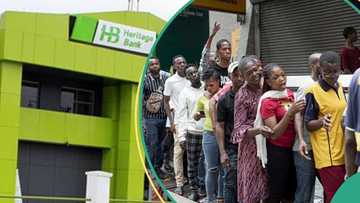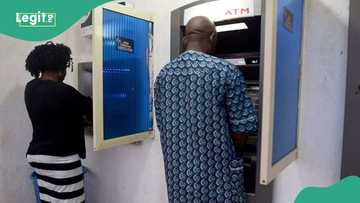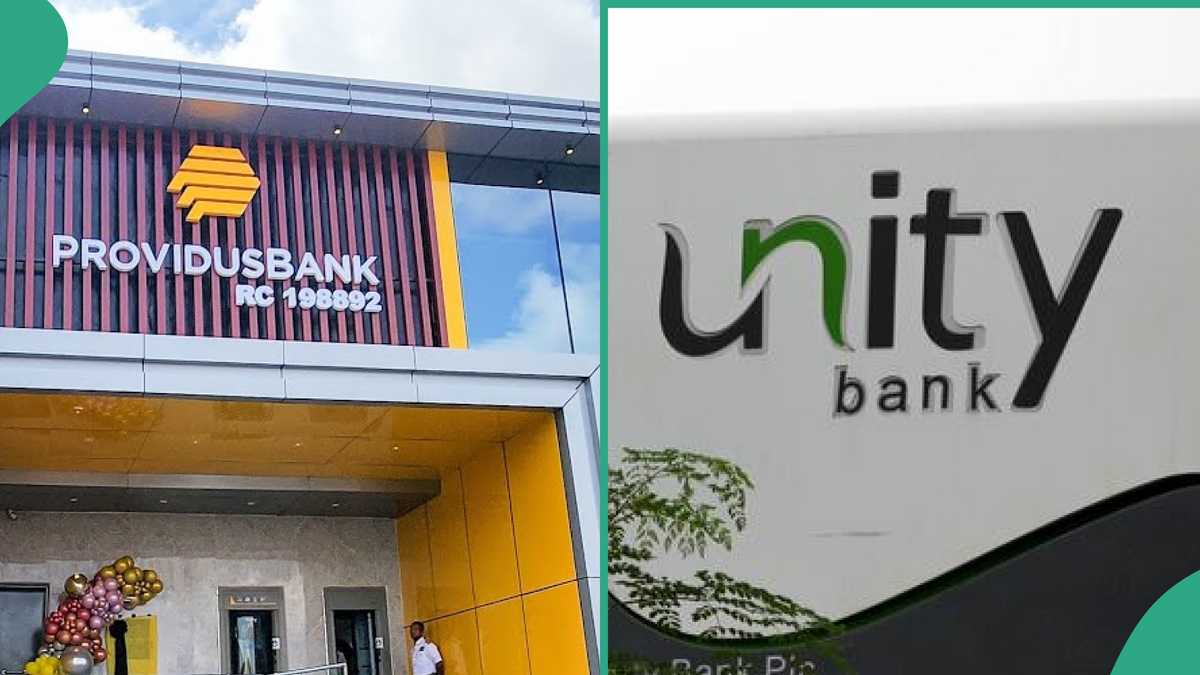243 Branches, Tier-2 capital, 8 Other Things to Know About the Providus-Unity Bank Merger …C0NTINUE READING HERE >>>
The Central Bank of Nigeria approved the recent merger of Unity Bank and Providus Bank with N700 billion loan to support the new organisationThe new bank will have 243 branches across Nigeria after adding the 23 branches of Providus Bank and the 220 branches of Unity BankIt was claimed that a sizeable amount of the support—N303.7 billion—will be used to settle its N92 billion debt to First Bank of Nigeria
Unity Bank and Providus Bank merged recently, with approval from the Central Bank of Nigeria (CBN) subject to a N700 billion loan to support the newly formed financial organisation.
The first bank merger at the CBN under Yemi Cardoso’s direction is Unity-Providus Bank. Photo Credit: Unity bank, Providus Bank
Source: UGC
As per the CBN circular, the financial assistance is needed to fortify the stability of Nigeria’s financial system and avert certain systemic hazards.
Ten things about the merging of Unity Bank and Provident Bank are listed by BusinessDay:

Read also
Why CBN endorsed Providus Bank’s takeover of Unity Bank
1. First Nigerian banking merger in five years.
Since the combination of Access Bank and Diamond Bank in 2019, this is the first merger in the Nigerian banking industry.
PAY ATTENTION: Сheck out news that is picked exactly for YOU ➡️ find the “Recommended for you” block on the home page and enjoy!
It also represents the second significant step toward banking consolidation since the CBN announced the recapitalisation program; the first was Heritage Bank’s license revocation.
2. New bank will have 243 branches
With the addition of Providus Bank’s 23 branches and Unity Bank’s 220 branches, the combined banking organization will have 243 branches throughout Nigeria, placing it in the top ten largest banks in the country by branch network.
It is anticipated that the digital platforms of both banks would also be in sync. Providus Bank is the owner of ProvidusPlus, whereas Unity Bank is the owner of the mobile app Unifi by Unity Bank.

Read also
POS operators slash charges as currency outside bank hits all-time high
3. CBN’s N700 billion loan
In August, the CBN authorized N700 billion in funding for the merger.
With a minimum interest rate of 6% and a 20-year duration, the loan has a floating interest rate equal to the MPR minus 11%. The loan is subject to a five-year moratorium. But while the principal repayment will take place over the next 15 years, interest payments will only be made every other year.
4. The loan will be used to pay off Unity Bank’s N303.7 billion obligations
It was alleged that Unity Bank’s liabilities, including its N92 billion debt to First Bank of Nigeria, will be settled with a sizable portion of the support—N303.7 billion.
Additionally, it would be used to pay off the bank’s N135 billion obligation to NIRSAL (Nigeria Incentive-Based Risk Sharing System for Agricultural Lending) and its N51.7 billion liability to the CBN from the Anchor Borrower Scheme.

Read also
NDIC pays Heritage Bank customers, lists steps to receive full payments
5. Tier-2 capital
Tier-2 capital would be met by the firm with the remaining N392.3 billion deposited in a 20-year FGN bond.
It will also strengthen the shareholders’ fund of Unity Bank from N202.1 billion as opposed to N190.2 billion in September 2023. This will equal N247.36 billion with the N45.25 billion total shareholders’ fund of Providus Bank.
6. Merger afford Providus Bank a Northern market reach
Born out of several of its predecessor banks, namely Bank of the North, Tropical Commercial Bank, Intercity Bank, and New Africa Bank, Unity Bank boasts one of the largest branch networks in Northern Nigeria.
In Nigeria’s financial system, Unity Bank was distinctive, especially in the northern areas, despite its troubled legacy. In many communities, the bank provided essential services to state and municipal governments that had limited access to financial services.
7. First bank merger under Yemi Cardoso

Read also
List of five largest commercial banks in Nigeria by assets in 2024
Under Yemi Cardoso’s leadership at the CBN, the Unity-Providus Bank merger is the first bank merger. In keeping with the CBN’s goal to preserve financial system stability, it is also the first bank rescue undertaken by the current governor of the central bank.
One of the CBN’s main objectives in a nation where 37% of rural Nigerians lack access to banking is financial inclusion, which is why the merger of the two banks is significant.
8. Asset size of about N2.43 trillion
With total assets of N1.5 trillion as of December 2023, Providus Bank has demonstrated robust growth and sound financial management. The bank has grown its assets by 189 percent in three years from N543 billion in 2021.
Combined with Unity Bank’s total assets of N423 billion, according to its unaudited accounts for the period ending September 2023, the new bank’s total assets will amount to about N2.43 trillion.

Read also
CBN sells dollars cheaply again to banks as naira gains in official, black markets
9. Customers deposits will be N848.9 billion
The new bank will get a total deposit of N848.9 billion from the N504.5 billion in client deposits from Providus Bank and the N344.4 billion from Unity Bank.
10. N151.8 billion in recapitalisation funds still required
Under the revised capital requirements, the bank must raise N151.8 billion in order to preserve its national banking license, as the two banks have paid-up share capital of N48.2 billion.
Nigerian Bank Downgraded for Breach of Minimum Regulatory Capital
Henzodaily.ng reported that Union Bank of Nigeria Plc’s Long-Term Issuer Default Ratings (IDR) have been lowered by Fitch Ratings from “B-” to “CCC,” and its National Long-Term Rating has been downgraded from “BBB(nga)” to “B+(nga).”
A downgrading of the bank’s Viability Rating (VR) from “b-” to “ccc” was also made due to worries about potential capital requirements violations.
Fitch also confirmed UBN’s Government Support Rating (GSR) of “no support” in its rating that was made public on Friday.
Source: Henzodaily.ng
>
